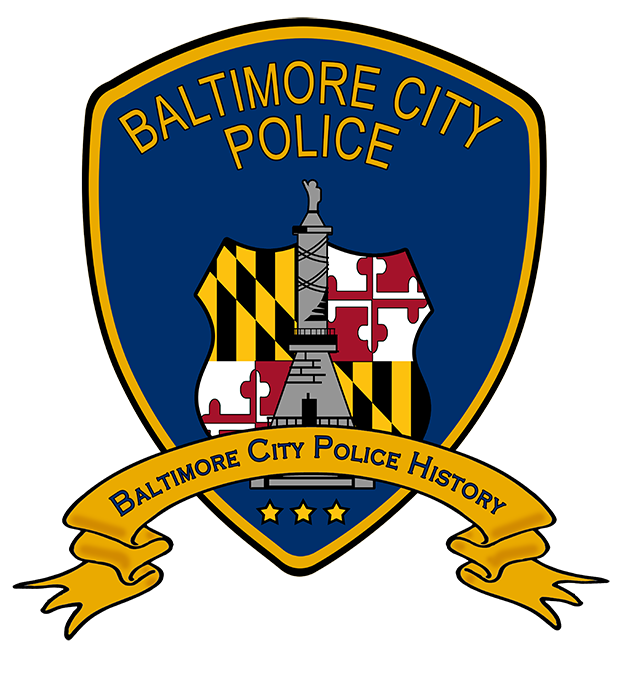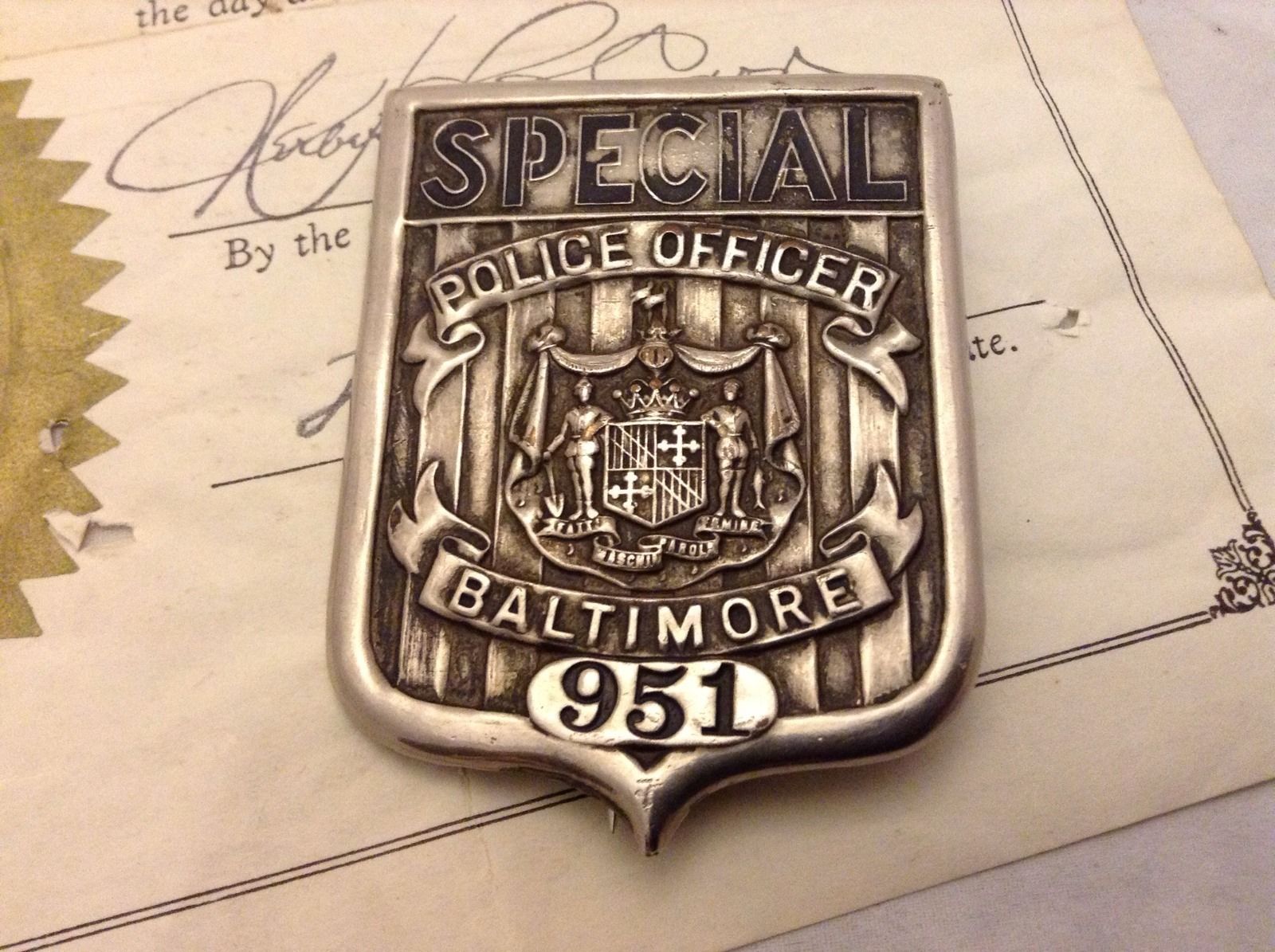Special Police
A special police officer is an individual at least 18 years old, who holds a commission granted by the Governor. Generally, a commission authorizes the officer to arrest individuals who trespass or commit offenses on the property described in the commission, exercise the powers of a police officer on the property described in the commission, and exercise the powers of a police officer in a county or municipal corporation associated with the property described in the commission, and direct and control traffic on public highways and roadways in the immediate vicinity of the property described in the commission.
Special Police Maryland
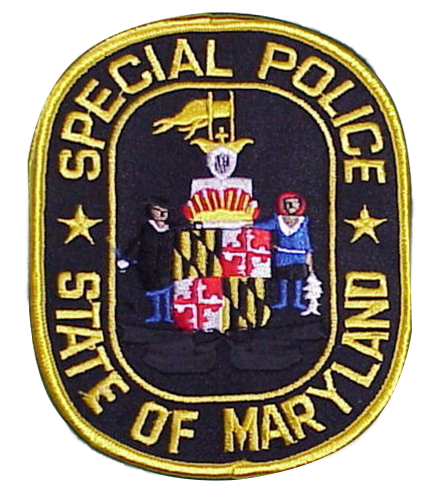
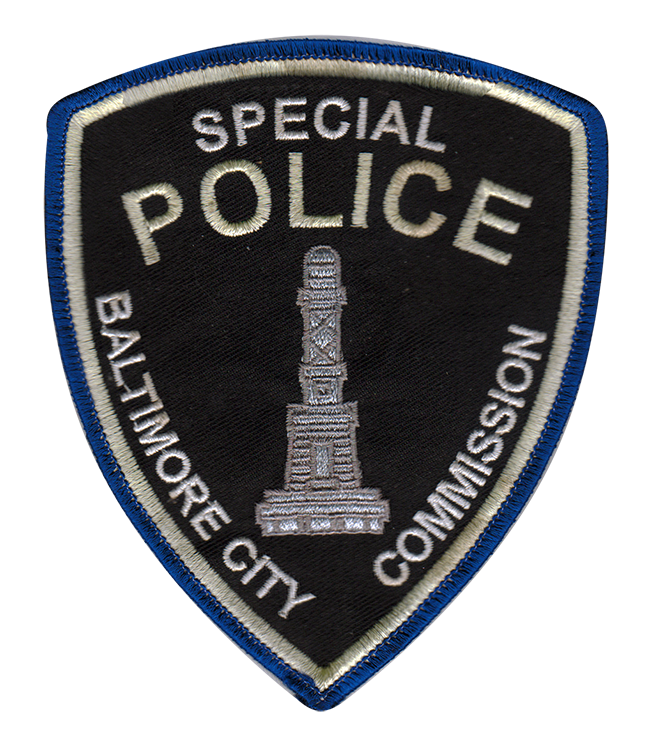
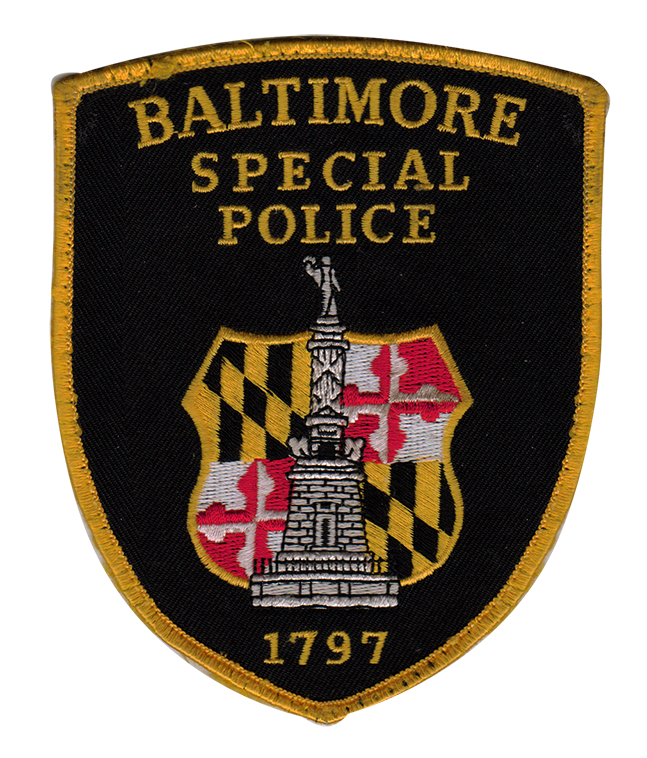
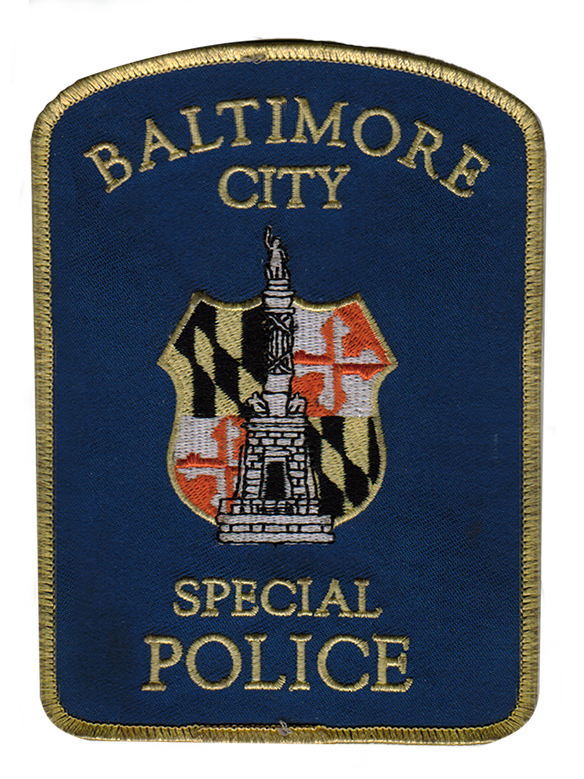
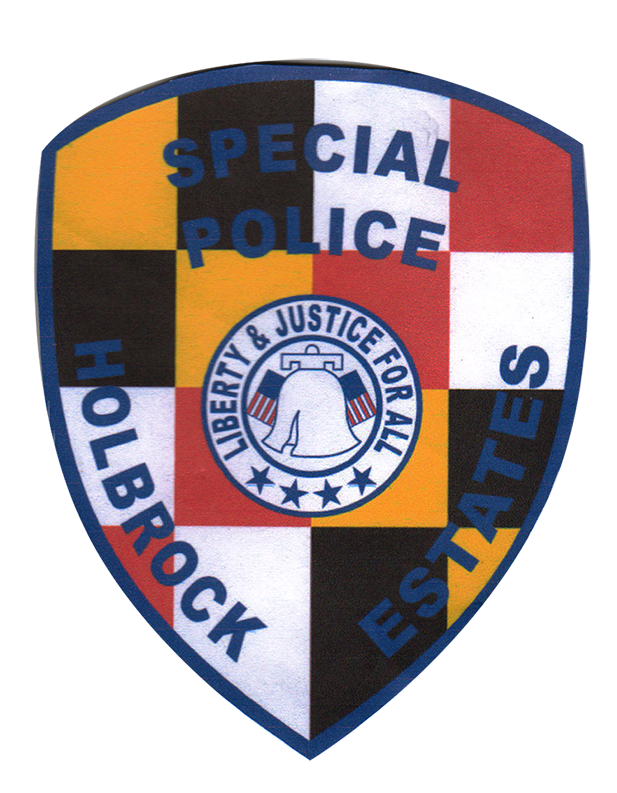
What is a Special Police?
A special police officer is an individual at least 18 years old, who holds a commission granted by the Governor. Generally, a commission authorizes the officer to arrest individuals who trespass or commit offenses on the property described in the commission, exercise the powers of a police officer on the property described in the commission, and exercise the powers of a police officer in a county or municipal corporation associated with the property described in the commission, and direct and control traffic on public highways and roadways in the immediate vicinity of the property described in the commission.
Who Should Apply?
You may apply for the appointment of an individual as a Special Police Officer if you are:
1. A municipal corporation, county, or other governmental body of the State, in order to protect property owned, leased, or regularly used by the governmental body or any of its units;
2. Another state, or subdivision or unit of another state, that has an interest in property located wholly or partly in this State, in order to protect the property;
3. A college, university, or public school system in the State, in order to protect its property or students; or
4. A person that exists and functions for a legal business purpose, in order to protect its business property such as:
A property owner;
A corporate officer in a partnership;
A person with legal capacity to represent the property owner; or
A person who possesses a business interest in the property to be protected.
The individual for whom the appointment is sought shall be:
1. of good moral character, reputation and qualification; and
2. at least 18 years old;
How To Apply
The employer submits the application for each individual applicant seeking a commission. The Special Police Commission unit will only accept applications completed electronically on the PDF form(s) provided to the left under Documents for initial and renewal applications. Please answer all questions accurately, completely and honestly. Once completed, the PDF form should be printed, signed, and mailed.
Mail the application packet to the Licensing Division at the address provided above. Allow 90 business days for the completion of the application process. If the Licensing Division does not receive the renewal application, satisfactorily completed, by the expiration date, the applicant must begin as a new applicant and complete all requirements necessary for an initial application.
All original applications require FBI and CJIS fingerprint submissions. Additionally, applicants must submit two photographs of applicant (2"x2" square, light background, head and shoulder full face, no hat, no dark glasses).
Sun Paper reports from the 1800's of City Hall asking members approve appointing Special Police in Baltimore
Mar 22, 1844 - A message was received from the mayor, in which he asked that the members of the second branch consider favorably the ordinance from the first branch for the reestablishment of the office of Deputy high Constable; and also suggest that a small appropriation be placed in the hands of the Mayor for the employment of a special police on the Sabbath the message was read. He also sent a communication, in which he announced his approval of sun-dried resolution was originated in this branch.
Apr 17, 1856 - Present all the members except Mr. Pennington, The ordinance authorizing Andrew McLaughlin, to appoint two special police at the City Hotel, during the time occupied in making repairs thereon, was adopted.
THE NEW POLICE BILL
Dec 25, 1856
Section 21. And it further an act and ordained, that the mayor shall have power and authority to call out and commission and a number of special police officers, when he shall deem it necessary to preserve the peace of the city, and to arm them, if he shall think proper; and the said special police officers shall be retained no longer that shall be necessary for the protection of the peace on the occasion, and shall be subject to two orders of the Marshal and such officers as he may place over them; and they shall be paid for their services $1.50 a day
Section 22. And be it further enacted or are deigned, that of any person, except a member of the police, and except also a substitute who show be discharging the duties of a police officer, shall publicly where any such uniform, badge or distinguishing number as may be worn by a member of the police, he shall forfeit and pay for such offense not less than one dollar or more than $20.
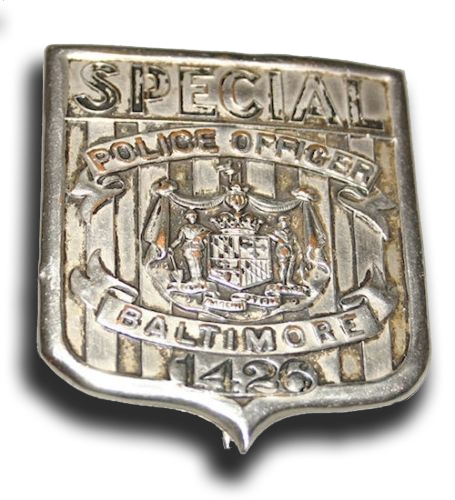
Courtesy Patty Driscoll
Courtesy Mark Mossa
1943 Baltimore City Special Police

Private Police Regulations Listed
By William Mock
4 August 1969
The Baltimore Police Department has laid down regulations for the private police who guard scores of businesses here in Baltimore.
Probably the most significant part of the order from Donald D. Pomerleau, the Police Commissioner - under authority given the department in 1906 but never used – is a set of guidelines governing police and security uniforms.
A move to regulate the uniforms worn by Special Police follows complaints that many use uniforms that too closely resemble those worn by Baltimore Police.
New guidelines
Guidelines for the appearances of uniforms, and deadlines in which they must meet the new regulations are;
- No shoulder patch may be worn on the left sleeve of the uniform, a trademark of Baltimore Police, and those patches now in use by Special Police Officers must be removed by 15 August 1969.
- Special Police Officers must wear in plain view a distinctive badge and hat device that clearly distinguishes the officer from a member of the Baltimore Police Department by 30 September 1969.
- Uniforms similar in color to Baltimore Police Uniforms must be differentiated by a one-inch scarlet [red] stripe worn on the Special Police Officers uniform trousers seam by 30 September 1969.
- All collar insignias now worn by many Special Police Officers, another trademark of Baltimore Police to distinguish rank, must be removed from Special Police Officers’ uniform by 30 September 1969.
To Review all Uniforms
In releasing the new regulations, Mr. Pomerleau said that the Baltimore Police Department will review all uniforms and maintain the right “to accept or refuse” any uniforms used by business firms.
At the same time, the commissioner set a $25 Licensing Fee for his departments review of applicants seeking employment by commercial security firms, and a $10.00 fee for annual review of each license issued.

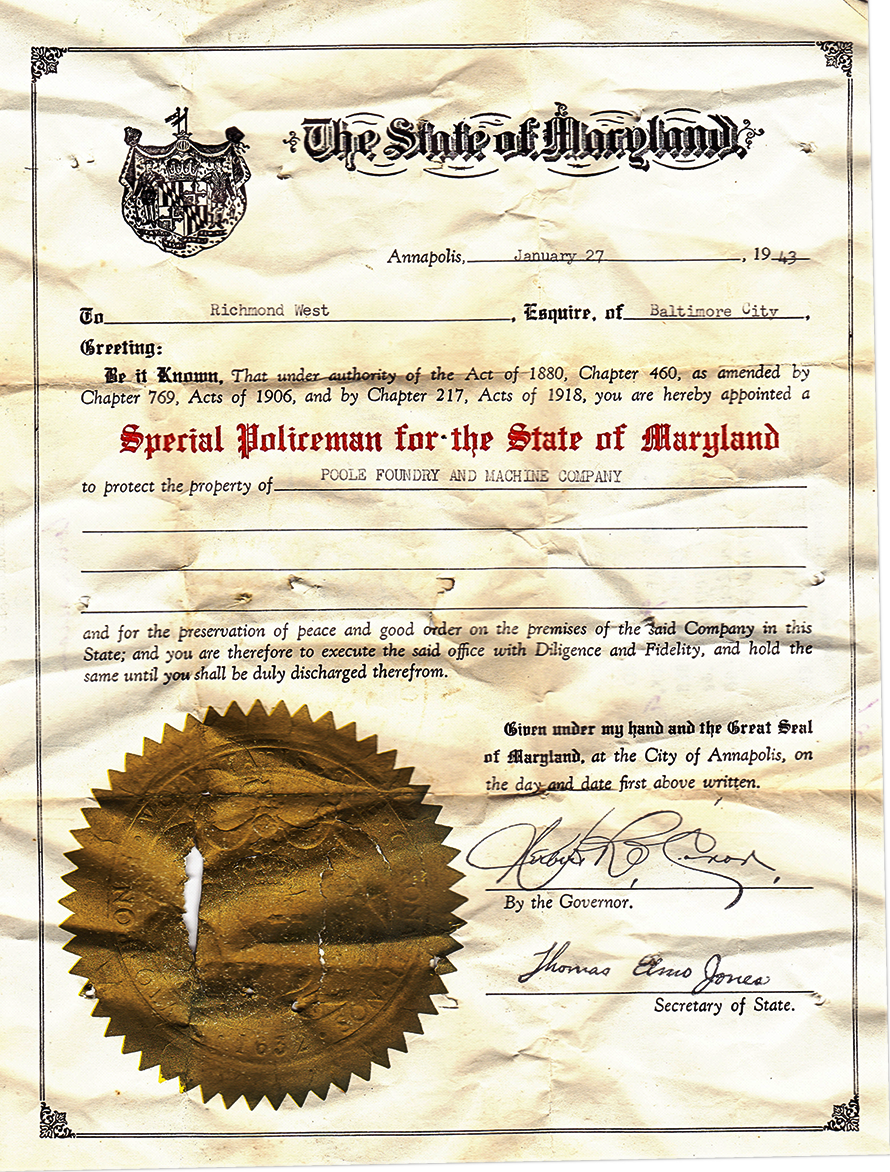
Courtesy Mark Mossa
1943 Baltimore City Special Police
![]()
Baltimore Re-Evaluating ‘Special Police’ Program
21 October 2012
BALTIMORE (AP) — The Baltimore police department is re-evaluating a program that empowers certain security guards to act as police officers and make arrests.
The guards, known as “special police,” can detain suspects and make arrests on certain properties, but aren’t trained by city or state police.
A Baltimore police spokesman tells The Baltimore Sun that the department is re-evaluating whether to continue granting the guards special police licenses. The move comes as special police officers face lawsuits accusing them of overstepping their boundaries, and complaints from citizens who say they operate without oversight.
One lawsuit filed this summer accuses the officers of violating residents’ civil rights.
Special police officers work at designated locations, including shopping centers, apartment complexes, the District Court of Maryland and Johns Hopkins University.
(Copyright 2012 by The Associated Press. All Rights Reserved.)
The least respected Police in the state, and for no reason, these men and women like any other officer in the state, risks their lives to make our lives better, safer, and well protected. Still they read articles like what follows:
Wearing the Badge
Our view: Maryland needs uniform standards of training and professional licensing for special police officers
October 23, 2012
To become a barber in Maryland, you need to have completed 1,200 hours of classroom instruction or 2,250 hours as an apprentice. The state requires licensed foresters to have a four-year college degree in forestry, two years of experience and five references. You even need to pass an exam to work as an interior designer. But all it takes to be given the power to detain people, search them and even arrest them is to fill out a two-page form. No training required, and for all intents and purposes, no oversight. Maryland's "special police" officers have generated periodic complaints and lawsuits, but it's a miracle that nothing worse has happened yet. State lawmakers need to step in with new regulations and oversight.
Under a long-standing but little-known law, private employers can hire so-called special police who are commissioned by the city or state to protect designated properties around businesses and other sites. As The Sun's Justin Fenton reported on Sunday, the city currently has about 50 such officers, most of whom work for large, well-known institutions such as the Johns Hopkins University and Mercy Medical Center, or as bailiffs for the District Court system. Another handful work for private security companies, a church and small businesses. All told, there are about 1,000 private security guards with special police powers across the state.
They operate without the accountability or oversight to which real police officers are subject, and that is a problem. If sworn officers of the city, county or state police overstep their authority, they can expect to be hauled before their department's internal affairs unit, which could open an inquiry leading to disciplinary action or dismissal. But there's no such mechanism to rein in the actions of special police. If they misbehave on duty, there's no one to hold them responsible except the private employer they work for, who may have little incentive to investigate the matter, especially if it could render the employer liable for civil or criminal damages.
And the city and state government shouldn't be so sure that they can't be held liable for misconduct; after all, they are effectively deputizing these officers and granting them police powers.
The lack of accountability and oversight is compounded by the fact that special police don't have to have the same level of training that regular police possess, nor the same mastery of the law. That's because there are no uniform standards for granting special police commissions across the state. As a result, the competence of officers can vary widely. This year, there have been a number of complaints of special police exceeding their authority or otherwise abusing their powers. Residents of Cherry Hill in Baltimore filed a lawsuit this summer accusing special police working for a property management company of "terrorizing" the neighborhood, and a federal lawsuit brought by another local man charged special police with detaining and arresting him on false pretenses.
What is needed is, at minimum, a uniform set of standards for training and knowledge of the law for individuals to qualify for special police commissions. Right now, applicants have to undergo a criminal background check in order to work as special police, but that's about it. Given the confusion over the difference between sworn police officers, special police and ordinary security guards — the latter are to observe and report suspicious activity but not to engage — it's no wonder that residents complain they can't tell the difference between them. Given the real possibility of people who have no connection to law enforcement using fake badges and uniforms to impersonate officers, the situation is ripe for abuse.
State Sen. Brian Frosh, who chairs the Judicial Proceedings Committee, is right to say that it's crazy to let untrained private individuals who are ignorant of the law run around detaining and arresting citizens, and he has suggested the General Assembly look into the problem when it meets next year. Establishing a uniform set of standards and empowering the state police to issue professional licenses for special police comparable to those required by other occupations would be a good first step. The current patchwork of state and city laws not only isn't adequate to protect citizens' civil rights but sooner or later will lead to a tragedy that was all too foreseeable.
![]()
In Maryland, the special police are used as security officers, but are not just some cheap mall cop. Special police are able to arrest someone for a crime that they witness as long as it is on the property that they are guarding. If they attend police academy training, special police are also able to enforce traffic violations. Otherwise, special training is not required. Instructions
1 Contact the Maryland State Police or go to their website (see Reference section) to obtain an application for a special police license.
2 Contact a state police location regarding having fingerprints taken. They are required to be sent in with the application. It is also possible to have them taken on the local level with a police or sheriff's department or with the Criminal Justice Department for the state.
Maryland Criminal Justice Department
410-764-4501
3 Obtain two passport photos. You can typically have these taken at a photo shop.
4 Submit the application back to the Maryland State Police, having filled out the information about a special police license and any other licenses you are interested in. The form covers several. Have pages 7 and 13 notarized. Submit two passport-style photos and the fingerprint cards with the application, and fees.
![]()
POLICE INFORMATION
Copies of: Your Baltimore Police Department Class Photo, Pictures of our Officers, Vehicles, Equipment, Newspaper Articles relating to our department and or officers, Old Departmental Newsletters, Lookouts, Wanted Posters, and or Brochures. Information on Deceased Officers and anything that may help Preserve the History and Proud Traditions of this agency. Please contact Retired Detective Kenny Driscoll.

NOTICE
How to Dispose of Old Police Items
Please contact Det. Ret. Kenny Driscoll if you have any pictures of you or your family members and wish them remembered here on this tribute site to Honor the fine men and women who have served with Honor and Distinction at the Baltimore Police Department.
Anyone with information, photographs, memorabilia, or other "Baltimore City Police" items can contact Ret. Det. Kenny Driscoll at
Copyright © 2002 Baltimore City Police History - Ret Det Kenny Driscoll

